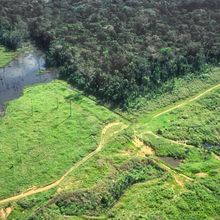Login
Subscribeenvironment, ecology

Environmental RNA Reveals Heat Stress in Water Fleas
Katherine Irving | Dec 2, 2022 | 5 min read
The eRNA detection method could one day be used to catch early warning signs of distress in wild ecosystems.

Avian Deception More Widespread Than Previously Thought
Andy Carstens | Oct 3, 2022 | 5 min read
The broken-wing display, in which birds fake being wounded to protect their nests from predators, is found across the avian phylogenetic tree, a study finds.

Pine Trees’ Fragrances Help Neighbors Battle Bark Beetles
Katherine Irving | Sep 30, 2022 | 5 min read
Polluted air impedes the trees’ ability to read one another’s signals, a study finds.

The Deepwater Horizon Oil Spill’s Hidden Impacts on Mahi-Mahi
Natalia Mesa, PhD | Sep 28, 2022 | 5 min read
Mahi-mahi were more likely to be eaten and less likely to spawn after being exposed to sublethal concentrations of oil, raising concerns about the risks oceanic drilling pose to life in the ocean.

For Frogs, Bigger Brains Mean Worse Camouflage
Natalia Mesa, PhD | Aug 23, 2022 | 3 min read
Frogs invest in cognitive capacity to avoid predators—up until there are too many hungry snakes around for the evolutionary strategy to pay off.

Plastic Pollution Boosts Bacterial Growth in Lake Water
Patience Asanga | Jul 26, 2022 | 3 min read
A study finds that not only did aquatic bacteria thrive when chemicals washed from degrading plastic were introduced into lake water, they also broke down organic matter more efficiently.

How Mange Remade an Ecosystem
Shawna Williams | Jul 5, 2022 | 5 min read
A study traces the effects of a mite outbreak from the earth to the heavens.

Spilling the Tea: Insect DNA Shows Up in World’s Top Beverage
Shawna Williams | Jun 14, 2022 | 5 min read
The Scientist speaks with Trier University’s Henrik Krehenwinkel, whose group recently detected traces of hundreds of arthropod species from a sample of dried plants—in this case, the contents of a tea bag.

World’s Largest Organism Discovered Underwater
Andy Carstens | Jun 2, 2022 | 2 min read
Off the western Australian coast, in Shark Bay, a field of seagrass big enough to cover Washington, DC, has flourished for more than four millennia, a new study finds.

Fifteen-Year Project Quantifies Threat to Reptiles
Shawna Williams | Apr 28, 2022 | 1 min read
The study estimates that one-fifth of reptile species worldwide are at risk of extinction.

Microplastics in Seawater May Harbor Parasites
Christie Wilcox, PhD | Apr 26, 2022 | 2 min read
Laboratory experiments find that Toxoplasma, Cryptosporidium, and Giardia can congregate on microplastic beads and fibers, suggesting they might make their way into and around the world’s oceans by hitching rides on tiny bits of trash.

Climate Change and Agriculture Together Halve Insect Populations
Dan Robitzski | Apr 21, 2022 | 2 min read
Insect populations and species diversity are drastically reduced in areas affected by both climate change and agriculture-related habitat destruction, according to a new study.

Earlier Nesting in Chicago-Area Birds Linked to Warming
Natalia Mesa, PhD | Apr 4, 2022 | 2 min read
A study finds that dozens of bird species are nesting up to 25 days sooner each year than they were a century ago, likely due to climate change.

Reimagining Ecology, 1939
Lisa Winter | Apr 4, 2022 | 3 min read
Edward Ricketts built his laboratory just onshore from the swirling tidepools of Monterey Bay, California, an ideal backdrop against which he developed a new system for studying the ecology of any given habitat.

Voles Trim Tall Grass to Prevent Attacks
Natalia Mesa, PhD | Mar 14, 2022 | 2 min read
Mongolian rodents join the ranks of earthworms and beavers as known ecosystem engineers.

Amazon Rainforest Nearing Savannah “Tipping Point”
Christie Wilcox, PhD | Mar 8, 2022 | 3 min read
Half or more of the world’s largest forest is in danger of transitioning into grassland, researchers say.

Sudden Decline in Salmon Growth May Signal Ecological Shift
Natalia Mesa, PhD | Mar 4, 2022 | 5 min read
The decrease in growth appears to be associated with increasing water temperatures, affecting animals throughout the marine food web.

Microbial Analysis of River Reveals Considerable Diversity
Annie Melchor | Mar 1, 2022 | 4 min read
Scientists in Canada trace how aquatic communities change as Quebec’s Romaine River flows into the sea.

World’s Rivers Rife with Drugs: Study
Christie Wilcox, PhD | Feb 15, 2022 | 2 min read
Levels of pharmaceuticals considered unsafe for aquatic organisms were found at more than one-quarter of sampling sites.

Environmental Memory: How Corals Are Adjusting to Warmer Waters
Amanda Heidt | Feb 14, 2022 | 10+ min read
Corals that previously experienced heat stress respond better the next time around. Researchers are trying to figure out how, and hope to one day take advantage of the phenomenon to improve coral restoration efforts.



